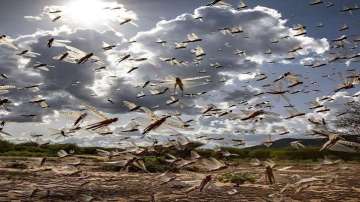The Haryana government has issued a high alert after a swarm of locusts entered Rewari and Gurgaon districts, with officials on Saturday asserting that all necessary measures have been taken, including deploying tractor-mounted spraying facilities. Swarms of locusts from Rajasthan after passing through Mahendragarh district of Haryana settled in various villages of Jatusana and Khol blocks in Rewari district on Friday evening.
On Saturday, they went towards Jhajjar and entered Gurgaon district with insects covering the skyline in some parts of the "millennium city".
Alarmed at the invasion of the locusts, which settled on trees, rooftops and plants, many residents of Gurgaon shared videos from their high-rise perches.
At many places in Gurgaon, residents kept their windows closed to prevent the insects from entering homes.
"It was a huge swarm of 5 km in length and 2 km in width which passed through Mahendragarh and settled down in Rewari. In the night, this swarm was near Jatusana block," Additional Chief Secretary, Agriculture and Farmers Welfare Department, Sanjeev Kaushal told PTI.
"Heavy insecticide spray was done during the night and early morning. About 35 per cent of the swarm was destroyed, but the rest which was still uge in number took off from there and crossed Jhajjar district and then got on to Gurgaon," he said.
Kaushal said that according to the inputs he had received from the central government, "it is likely that from the wind velocity and direction, it (locust swarm) will cross Palwal district and may then head towards Uttar Pradesh".
About the measures taken by the Haryana government, he said, "We are fully on alert, our districts have been alerted. We have sufficient quantities of insecticides stored there. We have tractor-mounted spray guns and these were deployed wherever necessary."
Officials said when locusts entered Rewari district, they settled on trees and standing crops like cotton and bajra, which had been recently planted.
Any damage caused was being assessed, they said.
To take stock of the situation, state Agriculture Minister J P Dalal visited Rewari and enquired from villagers and officials about the damage caused by locusts.
Talking to reporters in Rewari, Dalal said Mahendragarh, Bhiwani, Jhajjar and Rewari districts had been put on alert on Friday itself.
About Rewari district, he said 15 fire tenders, besides several tractor-mounted spray facilities were pressed into service during a night-long operation, which was carried out and personally monitored by Deputy Commissioner Yashendra Singh.
Dalal said even experts from the central government who visited Rewari to take stock of the situation had appreciated the timely measures taken by the district administration.
Replying to a question, he said that while the locusts are air-borne there was not much that could be done and measures are taken only after they have settled down on trees and in fields.
In many villages where locusts were spotted, the farmers beat 'thalis' (plates) and other utensils in a bid to ward off the insects away while local administration deployed tractor-mounted spray facilities.
Officials from the agriculture and other departments were keeping a close watch while supervision teams had been formed to tackle the situation.
Village-level WhatsApp groups too had been formed to keep the farmers informed, the officials said.
A month ago too Haryana had issued a high alert after locust swarms had attacked crops in neighbouring Rajasthan and a few other states, but luckily the insects had moved away from the state.
Earlier in January, locusts were spotted in some villages in Punjab's Fazilka and Muktsar districts but were effectively contained then.
Locusts, popularly known as ''tiddi dal'', are short-horned grasshoppers with highly migratory habits and voracious feeding behaviour.
Latest India News
